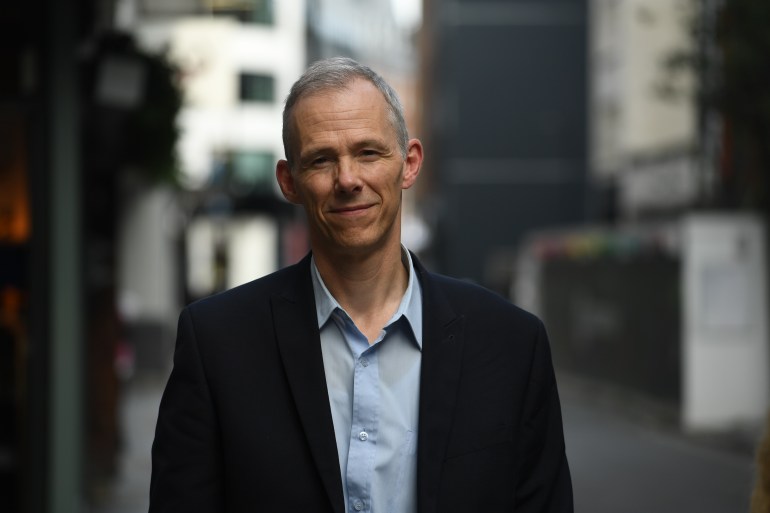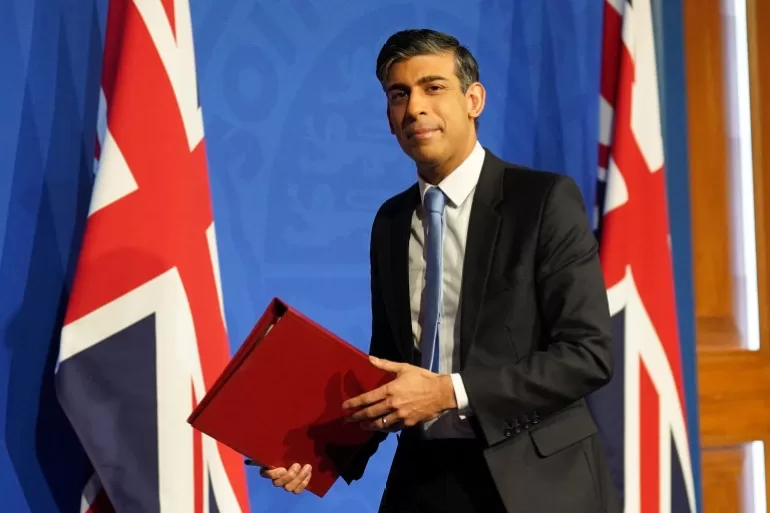The right-wing party that has governed Britain for more than 10 years is far behind the main opposition Labour Party in the polls.
Earlier this month, a YouGov survey of about 14,000 people published by The Telegraph newspaper predicted that Labour could win 385 parliamentary seats. The Conservatives are on track to keep just 169 seats, a sharper loss than in 1997 when Labour’s Tony Blair triumphed over John Major.
On the world stage, observers say Sunak’s decision to join the United States in targeting Yemen’s Houthis in retaliation for their attacks in the Red Sea and his refusal to call for a Gaza ceasefire could affect his approval ratings.
Al Jazeera spoke to Tim Bale, a politics professor at Queen Mary University of London, about the upcoming election, the challenges facing 43-year-old Sunak, and Labour’s chances.

Al Jazeera: Sunak faces several crises. As he struggles with a bid to deport refugees to Rwanda, the Ukraine war is still raging, as well as Israel’s onslaught of Gaza. Is he the right person to manage Britain’s foreign policy and government right now?
Tim Bale: I think you’d have to say he’s a bright guy. He’s a hard-working guy. So he’s probably across all the issues in as much as any prime minister could be.
I think his problem on the world stage is that very few of his interlocutors presume that he will be there by this time next year, which means that his influence is inevitably less than it otherwise would be.
At home, he suffers from the same problem in that I think any of the solutions he proposes, or any of the actions he takes, will always be seen as temporary rather than Britain’s policy going forward.
Al Jazeera: Many British Muslims and pro-Palestinian Britons say they are disillusioned with the two main parties since neither has vociferously called for a lasting ceasefire in Gaza. What impact will this have on the Conservatives, when it comes to the election?
Bale: I think it’s very unlikely that it will have any impact on the Conservatives’ vote because very few people who would be exercised about the war in Gaza, certainly on the Muslim side, will be supporting the Conservatives anyway. Their vote among Muslim voters is generally very low.
It’s possible that were we to be drawn, for example, into a wider conflict involving Yemen and were to start having to commit more forces to that theatre of war, I think the public might react against that and that government very much.
Concerning Labour, there’s a lot written about the threat to some Labour MPs representing constituencies with very high Muslim populations.
But very often, they have very, very big majorities, so even if there are some people in those constituencies who feel very strongly about Gaza and therefore vote against Labour, they’ve probably got a sufficient cushion to survive.
Also, it’s kind of reductive to suggest that voters with an Islamic faith are purely defined by that faith. They also have to operate in an economy that is suffering from a cost-of-living crisis.
Al Jazeera: As the new year gets under way, what are Sunak’s priorities?
Bale: The obvious one is the stop the boats issue and the ability or inability of the government actually to bring an end to people coming across the Channel to claim asylum.
The other issues are perennials [like] the state of the economy. Some people now suggest that Britain will go into a recession before the election, which is never good for a government.
Clearly, inflation is going down, but perhaps not quite as fast as people might want it to.
People are still suffering the cost-of-living crisis that they’ve been in for a year or two now.
The other big issue that the government doesn’t seem to be able to do anything about is the state of the National Health Service, the huge waiting lists and the difficulty in finding a [family doctor].
One possibility, towards the end of the year, will be the US election and the extent Donald Trump does or doesn’t endorse Rishi Sunak.
The possibility that Trump should be elected before we hold an election will make people feel that the world has suddenly become more unstable and, therefore, perhaps more inclined to vote for the current government than for a new option.

Al Jazeera: Election polls signal an election defeat for the Conservative Party, with a loss not seen since 1997. Is this likely?
Bale: It’s very difficult to imagine a government this far behind in the polls at this stage of the electoral cycle, with a PM who is, relatively speaking, very unpopular, presiding over an economy that is at best bumping along the bottom, and an NHS that most people seem to think is falling apart, will be able to win an election.
Obviously, Labour have got a big mountain to climb because they did so badly last time around. They have to win an awful lot of seats in order to win a majority.
But I think that looks now eminently possible. Still, I think forecasts of a landslide are probably over the top.
Al Jazeera: What trends are we seeing from early polling, particularly among the Britons who traditionally voted Labour but switched to the Conservatives in the 2019 election?
Bale: It’s clear that the Conservative Party has lost a lot of support in those seats that it flipped from Labour. Partly because [ex-UK PM] Boris Johnson was quite popular, partly because [ex-Labour leader] Jeremy Corbyn was very unpopular and partly because those seats were heavily in favour of Brexit.
Now that Brexit has, to some extent, disappeared in the rearview mirror, it is less of an issue for those voters, and what matters more to them is the kind of bread-and-butter issues like the economy and the NHS.
One would expect a lot of those seats to return to Labour given how poorly the government is judged to be handling those particular issues.
The government is also in trouble with so-called blue wall seats (which are loyally Conservative).
These are seats in the south and the east, which are rather more affluent. [The Conservatives are] very hard-line on immigration, on “woke”, and all that kind of stuff is not popular among well-educated people who often live in those affluent areas.
Generally speaking, [the trends] show that the government is regarded as exhausted, out of ideas, and too right-wing for many – and that doesn’t really bode well for its electoral chances.
Al Jazeera: What could we expect from a government under Labour’s Keir Starmer and the impact on European politics?
Bale: I think that’s the $64,000 question, in a way, because Keir Starmer and Rachel Reeves, the shadow chancellor, have presented a very cautious campaign.
They’re not offering far more spending. They’re not really levelling with people [on the] taxation required to help public services recover from the 10 years or so of austerity that we’ve seen.
I suspect that the Labour government would be rather more radical and more inclined to spend money than people think, and raise taxation.
In terms of the impact on European politics, generally speaking, Europe seems to be swinging to the right.
Were a Labour government to be elected, it would at least give some people in Europe the hope that it’s not completely impossible for a centre-left government, a bunch of social democrats, to win power.
Al Jazeera: Will the climate crisis be an election issue?
Bale: What is very urgent is the climate emergency. Although Labour has talked about a kind of big green investment fund, I think they will probably play that down because they’re worried about Conservative criticisms of the cost of that programme.
But if someone were to look back on this election in 50 years, when the planet will be much warmer, and we’re suffering all sorts of consequences as a result of that, they may well say, why were they talking about fairly trivial things when the world’s burning?
This interview has been lightly edited for clarity and brevity.
